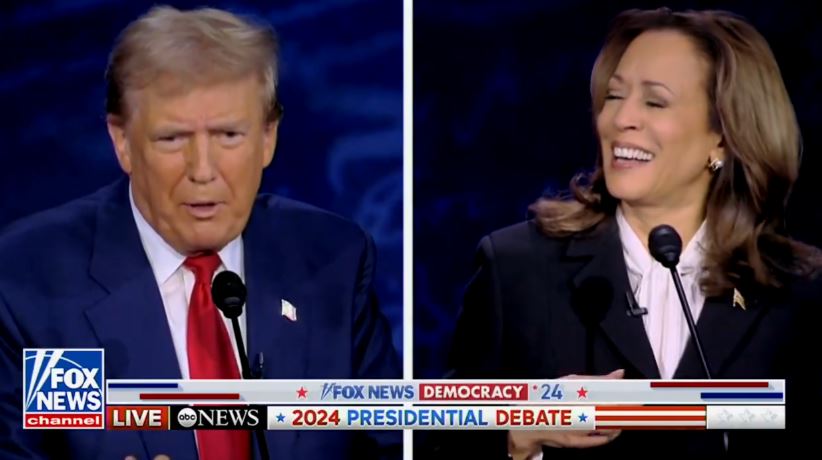By any conventional measure, United States Vice President Kamala Harris resoundingly beat Donald Trump in their first presidential showdown.
Of the two politicians on the stage in Philadelphia, Harris faced the steeper challenge — she needed to reintroduce herself to the American public in her new role, defend the record of President Joe Biden and at the same time differentiate herself as a candidate. She simultaneously had to frame the stakes of the election and prosecute the case against her opponent.
To varying extents, she accomplished all of these aims, summing up her argument in an oft-repeated and optimistic request that Americans turn the page with her on the ugliness of the Trump years.
Seizing the initiative
From the outset, it was clear that Harris was very well prepared, coming to the stage with a plan and an arsenal of points to be made.
Confidently crossing the stage to where Trump stood, she extended her hand and cheerfully introduced herself, setting the tone for a night in which Harris frequently seized the initiative.
It was in fact remarkable how Harris routinely made Trump visibly uncomfortable, something rarely seen happening to the former president on the public stage.
Again and again, Harris launched barbs that compelled Trump to exaggerate or make ludicrous claims, frequently flailing in his responses. A quip about crowd sizes at his rallies, for example, provoked a predictable boast about his events — “the most incredible rallies in the history of politics” — and set off a rhetorical meltdown from which Trump never truly recovered.
‘Fired by 81 million Americans’
When Harris recited a list of Trump advisers who have become his harshest critics, Trump argued he’d fired them all, setting up one of her most cutting lines of the night as Harris pointed out the former president had been fired by 81 million Americans in the last election.
That reinforced her message that it was time for Americans to turn the page and keep moving forward while also reminding them about Trump’s false claims that he won the 2020 election.
Trump found moments to attack, pressing Harris on the Biden administration’s role in approving the Nordstar pipeline between Russia and Europe.
But quite often his anger seemed to overstep the mark as he made false and ludicrous claims about windmills and solar power, babies being executed after birth and Haitian migrants eating family pets in Springfield, Ohio.
Such conspiratorial tones, while unchallenged in his rallies, seemed out of place and unpresidential, especially as Harris often openly laughed at him.
A bad night for Trump
Of course, these are not conventional times, and so the spin that follows within America’s sharply divided media ecosystem will ultimately prove at least as important in determining the debate’s long-term impact.
Media coverage suggests Republicans in general, and Trump in particular, felt the night did not go their way. Trump and his supporters have trotted out a variety of explanations and excuses, pointing to supportive online and unscientific polls, attacking the moderators and even floating a baseless conspiracy theory that Harris knew the questions in advance.
Preparation, however, is no conspiracy.
Stepping back, such denial once again underscores the true stakes of the election. For a democratic system to survive, as scholars of democracy have observed, candidates have to be willing to lose.
As Harris pointed out, Trump continuously indicates that he cannot recognize a loss when he has suffered one — and is not willing to play by democratic rules and norms, both written and unwritten.
Americans will have to decide in November whether they are indeed ready to turn the page on that approach to politics.



 Trump Endorses Japan’s Sanae Takaichi Ahead of Crucial Election Amid Market and China Tensions
Trump Endorses Japan’s Sanae Takaichi Ahead of Crucial Election Amid Market and China Tensions  JPMorgan Lifts Gold Price Forecast to $6,300 by End-2026 on Strong Central Bank and Investor Demand
JPMorgan Lifts Gold Price Forecast to $6,300 by End-2026 on Strong Central Bank and Investor Demand  Trump Backs Nexstar–Tegna Merger Amid Shifting U.S. Media Landscape
Trump Backs Nexstar–Tegna Merger Amid Shifting U.S. Media Landscape  China Warns US Arms Sales to Taiwan Could Disrupt Trump’s Planned Visit
China Warns US Arms Sales to Taiwan Could Disrupt Trump’s Planned Visit  U.S. Announces Additional $6 Million in Humanitarian Aid to Cuba Amid Oil Sanctions and Fuel Shortages
U.S. Announces Additional $6 Million in Humanitarian Aid to Cuba Amid Oil Sanctions and Fuel Shortages  U.S.-India Trade Framework Signals Major Shift in Tariffs, Energy, and Supply Chains
U.S.-India Trade Framework Signals Major Shift in Tariffs, Energy, and Supply Chains  Trump Says “Very Good Talks” Underway on Russia-Ukraine War as Peace Efforts Continue
Trump Says “Very Good Talks” Underway on Russia-Ukraine War as Peace Efforts Continue  India–U.S. Interim Trade Pact Cuts Auto Tariffs but Leaves Tesla Out
India–U.S. Interim Trade Pact Cuts Auto Tariffs but Leaves Tesla Out  Trump Signs “America First Arms Transfer Strategy” to Prioritize U.S. Weapons Sales
Trump Signs “America First Arms Transfer Strategy” to Prioritize U.S. Weapons Sales  Norway Opens Corruption Probe Into Former PM and Nobel Committee Chair Thorbjoern Jagland Over Epstein Links
Norway Opens Corruption Probe Into Former PM and Nobel Committee Chair Thorbjoern Jagland Over Epstein Links  FxWirePro- Major Crypto levels and bias summary
FxWirePro- Major Crypto levels and bias summary 
































